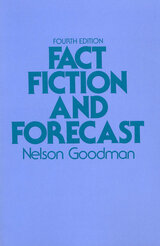
This novel approach to epistemological discourse explains the complex but crucial role that systematization plays-not just for the organization of what we know, but also for its validation. Cognitive Harmony argues for a new conception of the process philosophers generally call induction.
Relying on the root definition of harmony, a coherent unification of component parts (systemic integrity) in such a way that the final object can successfully accomplish what it was meant to do (evaluative positivity), Rescher discusses the role of harmony in cognitive contexts, the history of cognitive harmony, and the various features it has in producing human knowledge. The book ends on the issue of philosophy and the sort of harmony required of philosophical systems.

Here, in a new edition, is Nelson Goodman’s provocative philosophical classic—a book that, according to Science, “raised a storm of controversy” when it was first published in 1954, and one that remains on the front lines of philosophical debate.
How is it that we feel confident in generalizing from experience in some ways but not in others? How are generalizations that are warranted to be distinguished from those that are not? Goodman shows that these questions resist formal solution and his demonstration has been taken by nativists like Chomsky and Fodor as proof that neither scientific induction nor ordinary learning can proceed without an a priori, or innate, ordering of hypotheses.
In his new foreword to this edition, Hilary Putnam forcefully rejects these nativist claims. The controversy surrounding these unsolved problems is as relevant to the psychology of cognitive development as it is to the philosophy of science. No serious student of either discipline can afford to misunderstand Goodman’s classic argument.

Practical reasoning is not just a matter of determining how to get what you want, but of working out what to want in the first place. In Practical Induction Elijah Millgram argues that experience plays a central role in this process of deciding what is or is not important or worth pursuing. He takes aim at instrumentalism, a view predominant among philosophers today, which holds that the goals of practical reasoning are basic in the sense that they are given by desires that are not themselves the product of practical reasoning. The view Millgram defends is "practical induction," a method of reasoning from experience similar to theoretical induction.
What are the practical observations that teach us what to want? Millgram suggests they are pleasant and unpleasant experiences on the basis of which we form practical judgments about particular cases. By generalizing from these judgments--that is, by practical induction--we rationally arrive at our views about what matters. Learning new priorities from experience is necessary if we are to function in a world of ever-changing circumstances. And we need to be able to learn both from our own and from others' experience. It is this, Millgram contends, that explains the cognitive importance of both our capacity for pain and pleasure and our capacity for love. Pleasure's role in cognition is not that of a goal but that of a guide. Love's role in cognition derives from its relation to our trusting the testimony of others about what does and does not matter and about what merits our desire.
Itself a pleasure to read, this book is full of inventive arguments and conveys Millgram's bold thesis with elegance and force. It will alter the direction of current debates on practical reasoning.

Many philosophers believe they can gain knowledge about the world from the comfort of their armchairs, simply by reflecting on the nature of things. But how can the mind arrive at substantive knowledge of the world without seeking its input? Michael Strevens proposes an original defense of the armchair pursuit of philosophical knowledge, focusing on “the method of cases,” in which judgments about category membership—Does this count as causation? Does that count as the right action to take?—are used to test philosophical hypotheses about such matters as causality, moral responsibility, and beauty.
Strevens argues that the method of cases is capable of producing reliable, substantial knowledge. His strategy is to compare concepts of philosophical things to concepts of natural kinds, such as water. Philosophical concepts, like natural kind concepts, do not contain the answers to philosophers’ questions; armchair philosophy therefore cannot be conceptual analysis. But just as natural kind concepts provide a viable starting point for exploring the nature of the material world, so philosophical concepts are capable of launching and sustaining fruitful inquiry into philosophical matters, using the method of cases. Agonizing about unusual “edge cases,” Strevens shows, can play a leading role in such discoveries.
Thinking Off Your Feet seeks to reshape current debates about the nature of philosophical thinking and the methodological implications of experimental philosophy, to make significant contributions to the cognitive science of concepts, and to restore philosophy to its traditional position as an essential part of the human quest for knowledge.
READERS
Browse our collection.
PUBLISHERS
See BiblioVault's publisher services.
STUDENT SERVICES
Files for college accessibility offices.
UChicago Accessibility Resources
home | accessibility | search | about | contact us
BiblioVault ® 2001 - 2024
The University of Chicago Press









